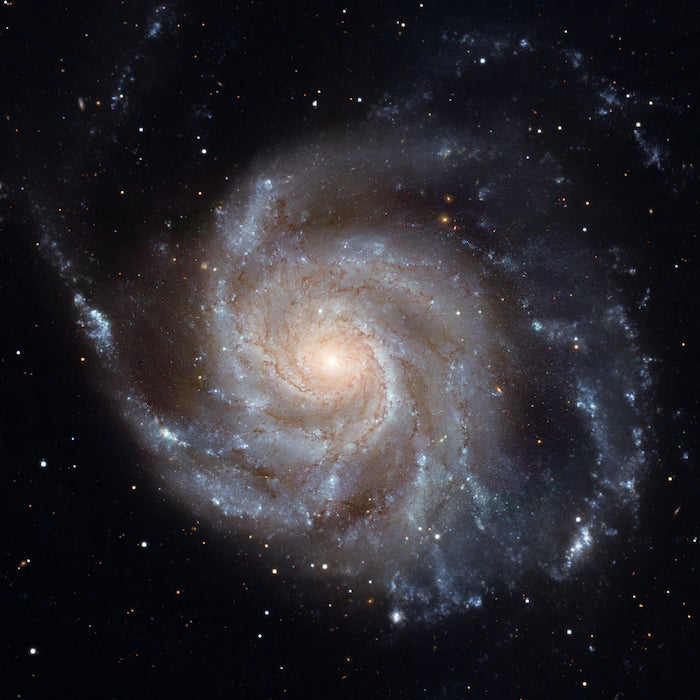This article was published in Scientific American’s former blog network and reflects the views of the author, not necessarily those of Scientific American
Well 2016, where do I begin to dissect you? A lot of good, really amazing things happened this year, but so too did a lot of awful and bewildering things.
Our species continued its exploration of the natural world. From the avatar-like travels of rovers on Mars to cometary inspections, minor planet close-ups, Saturnian system studies, Jovian polar wonders, and many more extra-terrestrial adventures. We've probed deeper and deeper into this planet's biological complexity, from extreme organisms to the root functions of life. And for the first time we've sensed the oscillation of space due to the merger of distant singularities - the pure conversion of mass into the energy of spacetime curvature.
We've also seen our machines reach new heights of sophistication. A Go-playing algorithm was able to beat a 9th dan human player 4-to-1, and did so by including strategies that it had, in effect, developed for itself. Deep learning approaches are getting better and better at finding meaning in complex data, and are doing so in ways that we simply cannot fully decode.
On supporting science journalism
If you're enjoying this article, consider supporting our award-winning journalism by subscribing. By purchasing a subscription you are helping to ensure the future of impactful stories about the discoveries and ideas shaping our world today.
If presented with these glimpses of 21st century human civilization, an objective intelligence might conclude that we're doing rather well. Add in elements of our artistic creativity and we present even better, a lively and curious species coming to grips with its place in the cosmos.
Except, well, I probably don't need to tell you about the flip side, but here are some examples.
We're still being truly awful to each other, and to the other species that we co-exist with. Dogma, prejudice, and plain old power and greed are making life miserable and dangerous for so many humans. Gutless wars and politics are destroying lives, young and old. Violence and intolerance are still not eradicated in even the most wealthy and (supposedly) sophisticated societies.
And left, right, and center, we're still making the same tedious and dangerous mistakes that our species has made for thousands and thousands of years - probably for even longer. We vote for people and ideas that make empty promises, we support behavior that is entirely short-term profitable, long-term devastating. I think we've also, in 2016, seen the full emergence of a terrifying phenomenon - the wholesale, global manipulation of facts and truths through and by our technological connectivity.
Of course, misinformation and bias has always existed for our social, talkative breed of hominid. It's in the nature of communication. But now we've built mechanisms via the internet that obliterate traditional filters, and allow for a never-ending avalanche of the good-the-bad-and-the-downright-ugly to envelop us. On top of this we're still stuck with our animal tendency to align ourselves with particular causes or mindsets, no matter how crude or simplistic they are.
The most obvious of these dogma are to do with religious beliefs, or political conviction. But I think there's also been a curious growth on the side of what many of us would consider to be the 'good fight'. For example, it feels like there's been a surge in the growth of a culture of 'science as identity'. There are sites like IFLScience. There is a gleeful willingness to declare oneself as a 'geek' or a 'nerd'. People like to "science the **** out of it" - as a badge of honor.
Although it's clear that some of this is a natural pushback against the forces of ignorance, I personally find the specific tone very odd, and quite at odds with my own scientific life. I've never seen science as something distinct from my own curiosity or interests. It barely needs a label, it is simply the experience of the world and the questions it prompts. In fact, I don't want to have to be labeled as a part of any group, or to present my identity that way. I am a scientist, but I don't think about myself as such, and I prefer it like that because I've always had a deep distrust of any grouping that discriminates between humans who are in and those who are out.
Being avidly science-orientated is certainly not the worst way a person can behave. But it unfortunately creates yet another potentially divisive fence between us. In a world where terms like 'post-truth' are now used (the stupidest, most idiotic concept imaginable, that plays wholly and awfully into the hands of the utterly unscrupulous), it's simply not enough to set up another subculture, we have to look for a way past and to a better place.
I don't know exactly how to do that, but I do think it will involve our development of a far less parochial worldview. That will have to cut multiple ways, from science to philosophy, culture and society, and with those pesky 'beliefs' that our species is drawn to.
To get there from here may require some jolts to the system. Discovering other life in the universe could be one of those jolts that wakes us from our sleepwalking, as could the development of strong artificial intelligence. Both would challenge our privileged position and likely also challenge the privileged position we often assign to our systems of thought.
Maybe the next 1/230,000,000th of a galactic orbit will see this happen.

